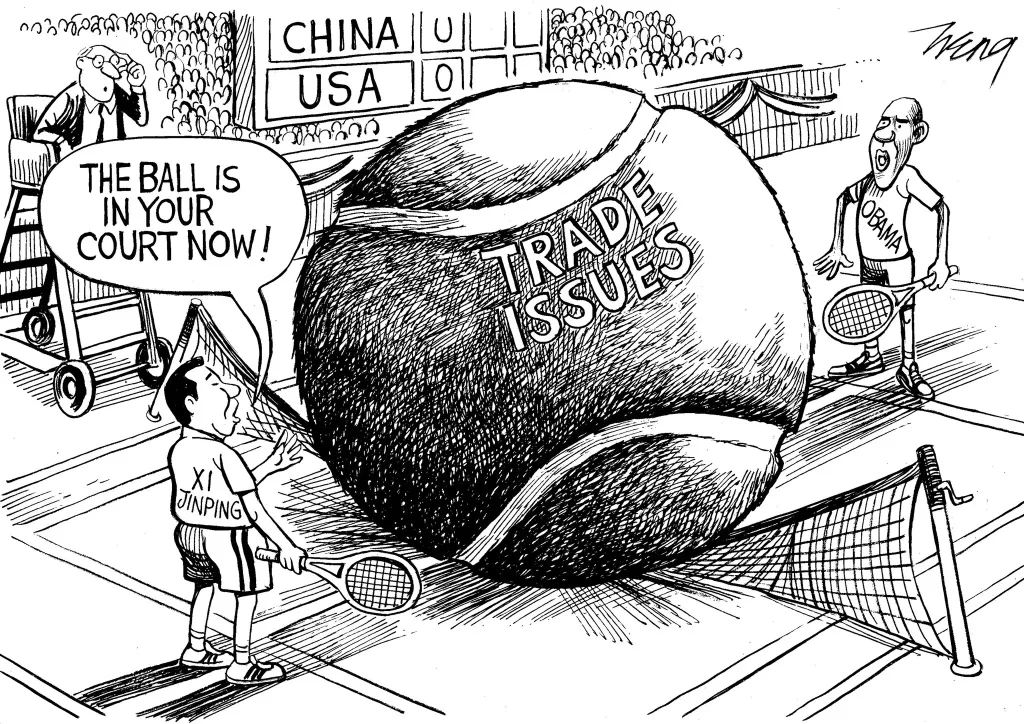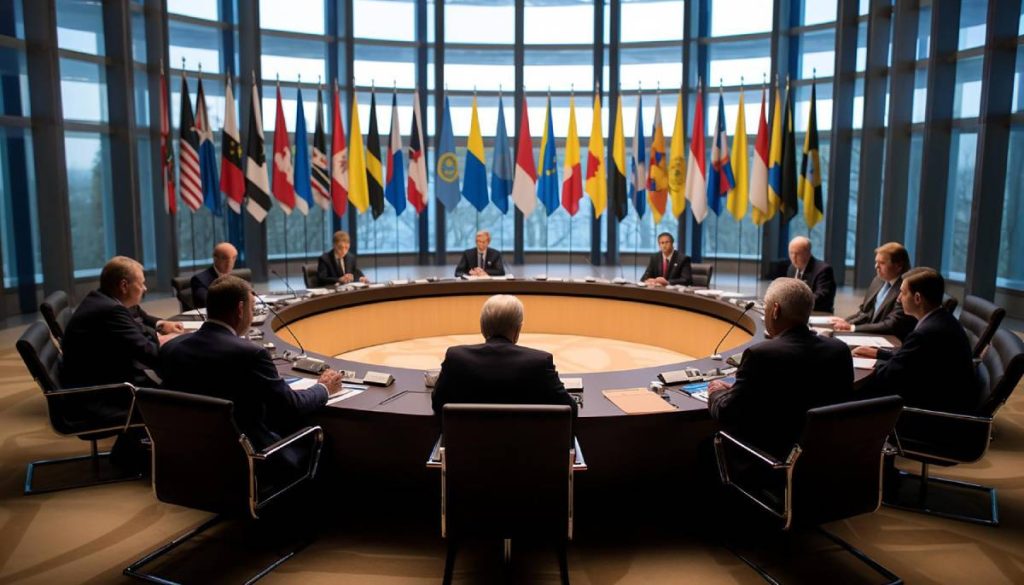U.S.-China trade issues have become a focal point of global economic discussions, prompting dialogue and strategic negotiations between the two superpowers. Treasury Secretary Scott Bessent recently emphasized the potential for a significant trade deal that could reshape the relationship between the United States and China. Highlighting the need for balance in the global financial system, Bessent criticized the current lending practices of the World Bank towards nations like China, which he believes no longer meet the criteria for developmental aid. The rapid economic growth in China poses challenges to the classification of the nation as a developing country, suggesting a need for reevaluation in light of its global influence. With ongoing tariff conflicts, the conversation surrounding U.S.-China trade issues is more critical than ever, as policymakers aim to restore stability and equity in international commerce.
The complex dynamics of trade relations between the U.S. and China entail a myriad of challenges and opportunities for the global economy. With discussions centering around revenue and tariff escalations, key figures like Scott Bessent are advocating for reform in financial institutions such as the World Bank, suggesting a shift in lending policies to reflect China’s emerging economic stature. As both nations grapple with the implications of their decisions on the international stage, the need for constructive dialogue is paramount. Issues of economic imbalance threaten to destabilize not only bilateral ties but also the broader global financial ecosystem. As the conversation unfolds, addressing the nuances of these trade relationships will be crucial for fostering a cooperative economic environment.
Understanding the U.S.-China Trade Conflict
The U.S.-China trade conflict has been one of the defining economic issues of the 21st century, significantly impacting both nations’ economies and the global market. Treasury Secretary Scott Bessent highlighted this ongoing tension, emphasizing that it presents a unique opportunity for constructive dialogue. He expressed the belief that a collaborative approach could lead both countries to re-balance their trade relationships, benefiting not just the U.S. but also global economies reliant on stable trade practices.
As countries grapple with the ramifications of tariffs and trade disputes, the focus on rebalancing is more critical than ever. Bessent pointed out that intentional policy decisions have often favored foreign manufacturing over domestic industry, undermining American competitiveness. This crucial aspect of the trade conversation reveals a need for mutual adjustments to restore equilibrium and ensure sustainable growth.
Scott Bessent’s Vision for the Global Financial System
In a recent address, Scott Bessent presented a visionary blueprint aimed at stabilizing the global financial system, which has come under considerable strain due to various economic pressures. Central to his proposal is the suggestion that institutions like the World Bank should reconsider their lending strategies, particularly towards nations that have achieved substantial economic growth, such as China. By re-evaluating their financial priorities, these institutions could better address the urgent needs of developing countries that require this support.
Bessent’s insights challenge the traditional classification of countries within the global financial framework. He underscores the idea that China’s significant economic achievements should position it differently in the lending landscape, advocating for a shift that would allocate resources more effectively. By ceasing to lend to China, Bessent argues that the World Bank can redirect essential funds to areas of greater necessity, which is vital for fostering global economic stability.
Critique of Current Lending Practices by the World Bank
Bessent’s criticism of the World Bank’s current lending practices stems from a belief that the institution should be a catalyst for true economic development rather than merely a financial supporter of already thriving nations. He argues that continued financial assistance to a powerful economy like China diverts critical resources away from countries that are still struggling to elevate their economic status. This shift, he suggests, is fundamental for strengthening the global financial system, particularly in an era marked by increasing inequality.
Furthermore, Bessent emphasizes that treating China as a developing nation is no longer tenable given its rapid economic evolution. By reshuffling the lending framework, financial institutions can incentivize responsible growth patterns and encourage emerging economies to develop their private markets without undue influence from wealthier states. This reimagining of support could spur innovation and encourage a more balanced economic landscape globally.
The Role of China in the Evolving Global Economy
Scott Bessent has highlighted China’s role in the global economy, suggesting that its remarkable growth places it in a unique position among nations. As China continues to ascend economically, the narrative that positions it as a developing country becomes increasingly outdated. Bessent calls for a reevaluation of China’s classification to ensure that its status reflects its influence and significance in international markets, which has far-reaching implications for trade and diplomacy.
Recognizing China as a key global player allows for more equitable trade discussions and contributes to a more collaborative approach in addressing outstanding imbalances. Bessent’s call for this change is rooted in the notion that China, if it truly seeks a seat at the table among developed nations, should act accordingly and adjust its economic policies to align with its actual capabilities and responsibilities.
Addressing Supply Chain Risks through Trade Reform
In his address, Bessent warned that the current state of supply chains—particularly those impacted by U.S.-China trade tensions—poses significant risks to national and economic security. He pointed out that the persistent trade imbalances and reliance on foreign production can make the U.S. vulnerable to economic shocks and disruptions. Reworking these supply chains through thoughtful trade reform could mitigate risks and enhance the resilience of the U.S. economy.
Alongside reforms in trade policy, Bessent advocates for a strategic examination of domestic manufacturing practices to strengthen local industries. By fostering a more robust manufacturing sector, the U.S. can secure critical supply chains and reduce dependency on foreign nations. This is essential not just for economic stability but also for national security, as a self-reliant manufacturing base can better withstand global disruptions.
The Future of Tariffs and Trade Relations
Bessent expressed optimism regarding the future of tariffs, specifically citing the potential for a de-escalation in the U.S.-China tariff conflict. The prospect of a highly negotiated trade agreement offers hope for both nations to establish a more balanced trade framework. By actively engaging in dialogue and diplomacy, both the U.S. and China may find common ground that addresses their significant trade imbalances and fosters smoother economic relationships.
The resolution of tariff disputes not only serves the interests of the U.S. and China but ultimately benefits global markets. A decrease in tariffs can lead to reduced prices for consumers and increased trade volumes, igniting economic growth on multiple fronts. Bessent’s advocacy for collaboration hints at a future where dialogue prevails over conflict, allowing both nations to address their respective economic needs while contributing positively to the broader global financial system.
Long-term Implications of U.S.-China Economic Relations
The nature of U.S.-China economic relations will shape global trade dynamics for years to come. As both nations work towards finding a sustainable confederation, the outcomes of current negotiations will have lasting effects on the global economy. Bessent’s remarks indicate that addressing trade issues effectively now could prevent future conflicts, setting a precedent for how countries interact economically in an increasingly interconnected world.
In light of the challenges posed by globalization, it is critical for the U.S. and China to establish frameworks that prioritize cooperation over competition. The potential for joint ventures and innovation stemming from collaborative economic policies could elevate both nations while enhancing the global economic landscape. Bessent envisions a future where mutual respect and balanced trade form the foundation of U.S.-China relations.
The Importance of Rebalancing Global Trade
Rebalancing global trade is not merely an economic necessity but a pathway towards greater global stability. With Scott Bessent’s emphasis on realigning trade relations, there is an opportunity to create systems that serve all nations more equitably. This rebalancing can lead to decreased tensions and foster a more collaborative international environment, where developing nations receive the support they require while larger economies like China assume greater responsibility.
Achieving this balance could redefine international trade practices and encourage nations to work together towards shared goals. For the global financial system to thrive, it must embrace a model that emphasizes fairness, opportunity, and mutual gain. Bessent’s vision for a more balanced trade approach is crucial in achieving that future.
Promoting Private Market Development in Emerging Economies
Bessent’s proposal to alter World Bank lending practices opens up discussions regarding the importance of fostering private market development in emerging economies. By redirecting resources from established economies like China to developing nations, there is potential to stimulate local entrepreneurship and create sustainable economic growth. A shift towards promoting private markets can empower nations to become self-sufficient and less reliant on external aid.
This focus on private market development can ultimately lead to a more equitable distribution of wealth globally. Encouraging entrepreneurship and innovation in the developing world can help lift entire communities out of poverty, creating a ripple effect that benefits the entire global economy. With the right support and infrastructure, emerging economies can become significant players in the international marketplace.
Frequently Asked Questions
What are the key U.S.-China trade issues highlighted by Scott Bessent?
Scott Bessent emphasizes that key U.S.-China trade issues revolve around the need to rebalance trade relationships and address economic imbalances. He proposes a cooperative approach to restore stability within the global financial system, which is increasingly affected by tariff conflicts.
How does Scott Bessent view World Bank lending to China in the context of U.S.-China trade issues?
In the context of U.S.-China trade issues, Scott Bessent criticizes the World Bank for its lending practices to China, arguing that it undermines the development of private markets and diverts resources from more critical needs. He believes this is an inappropriate use of funds for a country with significant economic growth.
What impact does Scott Bessent believe U.S.-China trade issues have on America’s manufacturing sector?
Scott Bessent suggests that U.S.-China trade issues have negatively impacted America’s manufacturing sector due to intentional policy choices by other nations. These choices have led to imbalances that threaten critical supply chains and overall economic security in the United States.
What solutions does Scott Bessent propose for resolving U.S.-China trade conflicts?
Scott Bessent proposes that the U.S. and China work together to rebalance their trade relationship, indicating that dialogue and negotiation are essential. He also encourages China to elevate its position in the global economy to match its economic status, which he believes will contribute to resolving U.S.-China trade conflicts.
Is there potential for de-escalation in the U.S.-China tariff conflict according to Scott Bessent?
Yes, Scott Bessent expresses optimism about the potential for de-escalation in the U.S.-China tariff conflict. He highlights President Trump’s decisive efforts to address imbalances as a step towards a more stable trade relationship between the two countries.
How has China’s economic growth influenced U.S.-China trade issues?
China’s rapid economic growth has significantly influenced U.S.-China trade issues by creating imbalances in trade relationships. Scott Bessent argues that recognizing China as a major global player is essential, impacting how trade policies and international lending, particularly from institutions like the World Bank, are structured.
| Key Point | Details |
|---|---|
| Opportunity for a Big Deal | Treasury Secretary Scott Bessent sees a chance for a significant agreement to address U.S.-China trade issues. |
| Blueprint for Global Financial Equilibrium | Bessent suggested a framework to rebalance the global financial system, involving institutions like the World Bank and IMF. |
| Criticism of the World Bank | He criticized the World Bank for lending to economically advanced countries like China, arguing it diverts resources from more pressing needs. |
| China’s Economic Status | Bessent pointed out that China should no longer be classified as a developing country due to its significant economic growth. |
| Impact on U.S. Manufacturing | He highlighted how policies from other countries have negatively impacted American manufacturing and supply chains, threatening U.S. security. |
| Decisive Actions by Trump | Bessent commended President Trump for addressing trade imbalances and expressed hope for potential resolution of the tariff conflict. |
Summary
U.S.-China trade issues have garnered significant attention as Treasury Secretary Scott Bessent outlines a potential path to address longstanding economic disparities. His call for a comprehensive agreement highlights the need for collaboration between the two nations to achieve a more balanced trade relationship. Bessent’s critiques of existing financial practices, particularly regarding the World Bank’s lending to China, underscore the evolving dynamics of global economics, urging for a reevaluation of how nations are classified based on their economic stature. With ongoing efforts to address imbalances, the future of U.S.-China trade may hinge on meaningful negotiations that reflect the realities of both economies.



